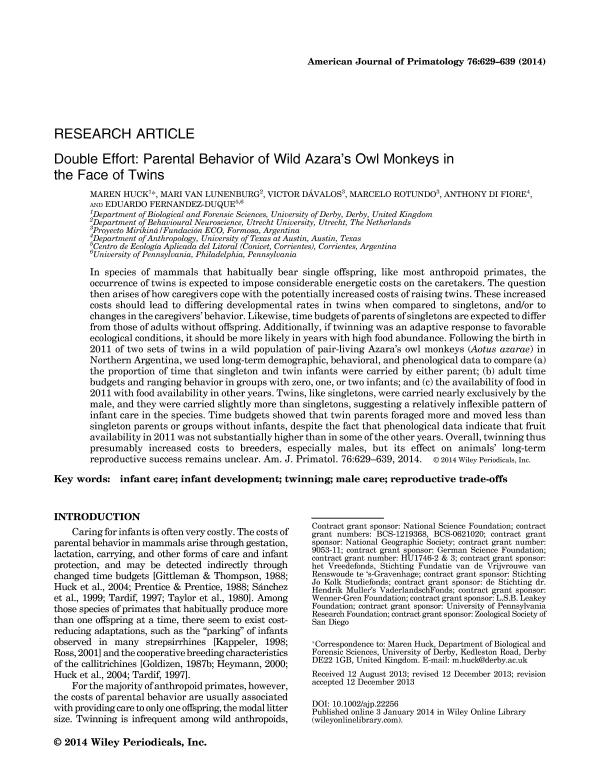Artículo
Double effort: parental behavior of wild Azara's owl monkeys in the face of twins
Huck, Maren; Van Lunenburg, Mari; Dávalos, Victor; Rotundo, Marcelo; Di Fiore, Anthony; Fernandez Duque, Eduardo

Fecha de publicación:
01/2014
Editorial:
Wiley
Revista:
American Journal Of Primatology
ISSN:
0275-2565
e-ISSN:
1098-2345
Idioma:
Inglés
Tipo de recurso:
Artículo publicado
Clasificación temática:
Resumen
In species of mammals that habitually bear single offspring, like most anthropoid primates, the occurrence of twins is expected to impose considerable energetic costs on the caretakers. The question then arises of how caregivers cope with the potentially increased costs of raising twins. These increased costs should lead to differing developmental rates in twins when compared to singletons, and/or to changes in the caregivers’ behavior. Likewise, time budgets of parents of singletons are expected to differ from those of adults without offspring. Additionally, if twinning was an adaptive response to favorable ecological conditions, it should be more likely in years with high food abundance. Following the birth in 2011 of two sets of twins in a wild population of pair‐living Azara’s owl monkeys (Aotus azarae) in Northern Argentina, we used long‐term demographic, behavioral, and phenological data to compare (a) the proportion of time that singleton and twin infants were carried by either parent; (b) adult time budgets and ranging behavior in groups with zero, one, or two infants; and (c) the availability of food in 2011 with food availability in other years. Twins, like singletons, were carried nearly exclusively by the male, and they were carried slightly more than singletons, suggesting a relatively inflexible pattern of infant care in the species. Time budgets showed that twin parents foraged more and moved less than singleton parents or groups without infants, despite the fact that phenological data indicate that fruit availability in 2011 was not substantially higher than in some of the other years. Overall, twinning thus presumably increased costs to breeders, especially males, but its effect on animals’ long‐term reproductive success remains unclear.
Palabras clave:
Infant Care
,
Infant Development
,
Twinning
,
Male Care
Archivos asociados
Licencia
Identificadores
Colecciones
Articulos(CECOAL)
Articulos de CENTRO DE ECOLOGIA APLICADA DEL LITORAL (I)
Articulos de CENTRO DE ECOLOGIA APLICADA DEL LITORAL (I)
Citación
Huck, Maren; Van Lunenburg, Mari; Dávalos, Victor; Rotundo, Marcelo; Di Fiore, Anthony; et al.; Double effort: parental behavior of wild Azara's owl monkeys in the face of twins; Wiley; American Journal Of Primatology; 76; 7; 1-2014; 629-639
Compartir
Altmétricas



